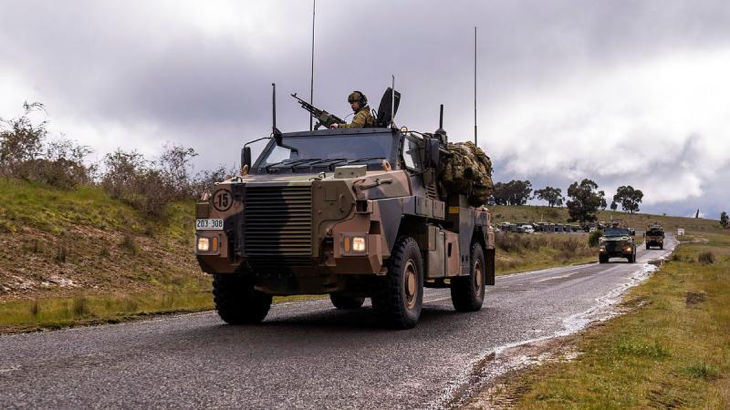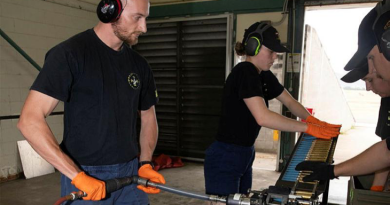Awake to the dangers of fatigue

Screaming, gunshots, crying.
Corporal Quinn Jensen heard this 24/7 with the mounting pressure not to do anything that would get himself or someone else killed.
CAPTION: The new Landworthiness Awareness Campaign will provide education and training on fatigue management, an important skill for all personnel, including drivers. Story by Private Nicholas Marquis. Photo by Private Michael Currie.
Deployed to extract people from Afghanistan in 2021, Corporal Jensen said the excitement, adrenaline and being “pumped” for a trip took over his initial exhaustion.
“We tried as best as we could in the situation. It was such a short-notice task. We had so much prep over the weekend – there was hardly any sleep,” Corporal Jensen said.
“You can only run for so long off adrenaline and nicotine. The third or fourth day it really started to hit people – not just physical fatigue but the mental and emotional.”
On the fourth day, after dropping off refugees, he and another section commander “zoned out” and came close to colliding with an American armoured truck during a driving task.
That’s when they realised a rest cycle was needed to reduce the likelihood of an incident occurring.
A hotel being used by British paratroopers nearby became their refuge.
“We essentially bought two or three rooms in this hotel off whoever owned it,” he said.
“Then we started our proper rest rotation cycle and would send lads in there for a few hours a day, probably four to six.”
Fatigue isn’t limited to high-tempo, overseas operations.
Imagine being on day 12 of an exercise with your energy tank running on the fumes from a stick of beef jerky.
Going 17 hours without sleep can impair your cognitive ability in a way similar to excessive blood-alcohol levels.
In response, a Landworthiness Awareness Campaign is rolling out to help identify and manage fatigue and raise awareness of other issues that impact capabilities and increase risk across Defence.
Lieutenant Colonel Scott McPherson is leading the rollout and said fatigue was a common contributing factor in Defence incidents.
“If I ask a driver what fatigue means, they often say ‘in accordance with the DRTMs, it’s getting eight hours’ rest’. No, it’s not, it’s much more than that,” Lieutenant Colonel McPherson said.
“It’s about how fatigue from our difficult operating environment physically wears you out and how it impacts people’s brains.”
A G-Wagon 6×6 with trailer rollover in 2022 was primarily caused by a lack of fatigue awareness and how to manage it effectively, according to Lieutenant Colonel McPherson.
“The driver was new to the unit, potentially not comfortable speaking up about being fatigued and, on a short drive, fell asleep at the wheel,” he said.
“They made an abrupt steering correction and caused the vehicle to roll multiple times on a highway.”
Even though minor injuries resulted, it could have been catastrophic.
According to Lieutenant Colonel McPherson, there is a “cultural choke point” where junior personnel might not feel comfortable speaking up.
He said the package targets 18 to 25 year olds, and “cuts through the noise”.
It aims to help Defence personnel understand what it means to them and what they need to do about it.
“You might be a sailor firing a 50-cal, an Air Force driver operating an HX77, a soldier on an artillery gunline, or a Defence civilian driving a vehicle on a range – it applies to all those people,” Lieutenant Colonel McPherson said.
“We can’t always stop and have a rest but we need personnel to recognise the telltale indications of ‘I’m getting tired now’ or ‘I need rest’ and speak up about it.”
Speaking in a soon-to-be-released podcast, Army psychologist Major Sam James highlighted the importance of taking care of your body and brain and speaking up about risks of fatigue.
“Fatigue is being mentally and physically stuffed,” Major James said.
“Most people need six to eight hours of sleep, but you’ll get some who will say they have four and are fine.”
It can be better managed by identifying those risks, getting the right sleep and having good rosters.
This should lead to fewer injuries, incidents and better situational awareness.
The requirements of sleep and rest differ between individuals according to Major James.
“I’ve never had a convo about fatigue when I or the other people in the room aren’t tired,” he said.
“I had a sergeant once say, ‘I get five hours sleep and have a thick black coffee before I go to bed’.”
Some studies have shown that people in the military can “surge” on five to seven hours’ sleep a night for a month.
But this is at the cost of bodies and motivation breaking with a decrease in performance and an increase in the risk of accidents.
The Landworthiness Awareness Campaign provides practical education and training that can help individuals and commanders at all levels.
As part of the new Defence Landworthiness package, fatigue management will be the first delivered package in the rollout.
.
.

.
.





